|
|
|
Sort Order |
|
|
|
Items / Page
|
|
|
|
|
|
|
| Srl | Item |
| 1 |
ID:
094041


|
|
|
|
|
| Publication |
2010.
|
| Summary/Abstract |
During the third quarter of 2009, there was a spate of reports in the news media and on the Internet accusing Burma and North Korea of engaging in a range of activities that potentially threatened regional security. It was claimed that the Naypyidaw regime had developed a close relationship with Pyongyang that included North Korea's sale to Burma of conventional weapons, assistance in the development of Burma's defence infrastructure and arms industries, and even collaboration on a nuclear weapons program. Given the lack of hard evidence, however, these reports raised more questions than they answered. Burma's nuclear status remains unknown. Another puzzle is why no government or international organisation has yet made an official statement on this particular issue, despite all the publicity it has attracted. Should it be determined that Burma does indeed have a secret nuclear weapons program, then a key question would be whether the generals are likely to be any more receptive to international concerns than they have been in the past, on other issues.
|
|
|
|
|
|
|
|
|
|
|
|
|
|
|
|
| 2 |
ID:
120616
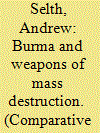

|
|
|
|
|
| Publication |
2013.
|
| Summary/Abstract |
Since 2000, bold claims have been made about Burma's ambition to acquire weapons of mass destruction, but few observers have asked two critical questions, the answers to which would illuminate this debate and allow for more nuanced analyses. These are: Why might Burma wish to possess nuclear weapons and ballistic missiles? and, How could it use them? A third question that has escaped serious attention is: If Burma did try to acquire WMD, what would be the net security implications for the country? All three relate to the mindset of Burma's military leadership since the 1988 uprising. Examination of these matters leads to another unknown, which is whether the regime's vision is shared by the country's apparently reformist new government.
|
|
|
|
|
|
|
|
|
|
|
|
|
|
|
|
| 3 |
ID:
000768
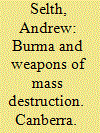

|
|
|
|
|
| Publication |
Canberra, Strategic and Defence Studies Center, 1999.
|
| Description |
24p.
|
| Series |
SDSC working paper;334
|
| Standard Number |
0731527569
|
|
|
|
|
|
|
|
|
|
|
|
Copies: C:1/I:0,R:0,Q:0
Circulation
| Accession# | Call# | Current Location | Status | Policy | Location |
| 042122 | 355.8209591/SEL 042122 | Main | On Shelf | General | |
|
|
|
|
| 4 |
ID:
080960
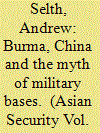

|
|
|
|
|
| Publication |
2007.
|
| Summary/Abstract |
Since the advent of a new, more outward-looking military government in 1988, Burma has come to occupy a position of considerable importance in the Asia-Pacific strategic environment. Burma's burgeoning relationship with China has attracted particular attention, not least because of the stream of reports in the news media and, to a lesser extent, academic literature, claiming that China has established several naval bases and intelligence collection stations in Burma. This apparent intrusion by China into the northeast Indian Ocean has strongly influenced the strategic perceptions and policies of Burma's regional neighbors, notably India. The reported facilities have also been cited as evidence that Burma has become a client state of China, and as proof of Beijing's expansionist designs in South and Southeast Asia. A close examination of the available evidence, however, suggests that there are no Chinese military bases on Burmese soil, a fact conceded by senior Indian officials in 2005. China still has a strong strategic interest in developing its bilateral relations with Burma but, based on this analysis, it would appear that China's presence in Burma, and its current influence over Burma's military regime, have been greatly exaggerated.
|
|
|
|
|
|
|
|
|
|
|
|
|
|
|
|
| 5 |
ID:
050903
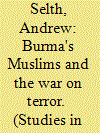

|
|
|
|
|
| Publication |
Mar-Apr 2004.
|
| Summary/Abstract |
Burma's importance in world affairs has long derived from its critical geostrategic position, but another factor now attracting the interest of Western scholars and officials is Burma's large Muslim population. Usually overlooked in surveys of Islam in the Asia-Pacific region, Burma's Muslims are now being accorded greater attention. This is partly because of the harsh treatment they are receiving at the hands of the country's military government, known since 1997 as the State Peace and Development Council (SPDC). It is also due, however, to their growing international connections, which in one case at least includes links to pan-Islamic extremist groups. In this regard, the global war against terrorism has become both a burden and an opportunity for the Rangoon regime
|
|
|
|
|
|
|
|
|
|
|
|
|
|
|
|
| 6 |
ID:
054097
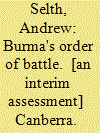

|
|
|
|
|
| Publication |
Canberra, National Library of Australia, 2000.
|
| Description |
33p.
|
| Series |
SDSC working papers; no.35
|
| Standard Number |
073152778x
|
|
|
|
|
|
|
|
|
|
|
|
Copies: C:1/I:0,R:0,Q:0
Circulation
| Accession# | Call# | Current Location | Status | Policy | Location |
| 044046 | 355.0332591/SEL 044046 | Main | On Shelf | General | |
|
|
|
|
| 7 |
ID:
083209
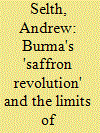

|
|
|
|
|
| Publication |
2008.
|
| Summary/Abstract |
The demonstrations in September 2007 were the most significant civil protests seen in Burma since the ill-fated pro-democracy uprising of 1988. The military government's brutal response to the latest unrest prompted an unprecedented level of diplomatic activity and a rare consensus on the need for political change. Since then, however, efforts to resolve the crisis have withered away, underlining the international community's inability over the past 20 years to make a significant impact on the situation in Burma. Neither the principled approach of some countries and organisations, nor the more pragmatic attitude adopted by others, has persuaded the regime to abandon any of its core positions. Indeed, by demonstrating the international community's continuing disagreement over Burma, and the limited policy options available, the lack of concerted action since the protests has probably encouraged the regime's obduracy and increased its confidence that it can survive external pressures. An appreciation of the generals' threat perceptions may help the international community to understand the regime's intransigence, but it is still difficult to see what policies can be effective against a government that puts its own survival before accepted norms of behaviour and the welfare of its people. Real and lasting change will have to come from within Burma itself, but the events of 2007 suggest that this is a distant prospect.
|
|
|
|
|
|
|
|
|
|
|
|
|
|
|
|
| 8 |
ID:
046867
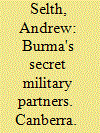

|
|
|
|
|
| Publication |
Canberra, Stategic and Defence Studies Centre, 2000.
|
| Description |
86p.
|
| Series |
Canberra Papers on Strategy and Defence;136
|
| Standard Number |
0731527755
|
|
|
|
|
|
|
|
|
|
|
|
Copies: C:1/I:0,R:0,Q:0
Circulation
| Accession# | Call# | Current Location | Status | Policy | Location |
| 044049 | 355.03109591/SEL 044049 | Main | On Shelf | General | |
|
|
|
|
| 9 |
ID:
084354
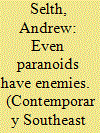

|
|
|
| 10 |
ID:
060989
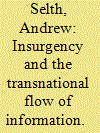

|
|
|
|
|
| Publication |
Canberra, National Library of Australian, 1991.
|
| Description |
25cm.
|
| Standard Number |
0731512421
|
|
|
|
|
|
|
|
|
|
|
|
Copies: C:1/I:0,R:0,Q:0
Circulation
| Accession# | Call# | Current Location | Status | Policy | Location |
| 039559 | 355.0218/SEL 039559 | Main | On Shelf | General | |
|
|
|
|
| 11 |
ID:
089914
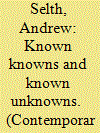

|
|
|
|
|
| Publication |
2009.
|
| Summary/Abstract |
As then US Defense Secretary Donald Rumsfeld stated in characteristic fashion, some security issues are easily researched and well understood, while others pose greater problems. Failure to recognize these "known knowns" and "known unknowns", or to acknowledge information gaps, can lead to misconceptions and errors of judgement. There are also mysteries - the "unknown unknowns". The study of Myanmar's armed forces (or Tatmadaw) is a case in point, yet anyone attempting to study them faces problems at three levels. At the first are the traps lying in wait for all who engage in such intellectual exercises, and strive for precision, balance and objectivity. At the second level are the challenges inherent in the study of any country's military capabilities. At the third level are the difficulties encountered by anyone studying modern Myanmar. Due mainly to the lack of reliable data, however, an accurate, detailed and nuanced assessment of Myanmar's military capabilities is currently impossible. It is difficult even to make judgements about its order of battle and defence expenditure, let alone the Tatmadaw's combat proficiency. Yet these kinds of issues are critical to an understanding of Myanmar's security
|
|
|
|
|
|
|
|
|
|
|
|
|
|
|
|
| 12 |
ID:
101241
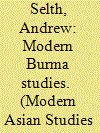

|
|
|
|
|
| Publication |
2010.
|
| Summary/Abstract |
Burma has never been a popular subject for academic research but, since a massive pro-democracy uprising drew worldwide attention to the country in 1988, the number of scholars and students engaged in the field has grown considerably. However, they still face a number of major challenges. Along with other kinds of area studies, Burma studies have been accused by academics from the more 'scientific' disciplines of being too narrowly focused and lacking theoretical rigour. Also, it has been difficult to conduct research in Burma's closed society. While the latest military government has relaxed some controls, field work is still constrained and reliable sources are hard to find. Often, the knowledge gap has been filled by myths and misconceptions. Adding to these problems, since 1988 the Burma studies community has become highly polarised, with political and moral factors often featuring more prominently in the public debate than considered arguments based on objective analysis. All these factors have adversely affected modern Burma studies and restricted understanding of this deeply troubled country by both scholars and the wider community.
|
|
|
|
|
|
|
|
|
|
|
|
|
|
|
|
| 13 |
ID:
166773
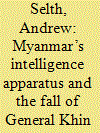

|
|
|
|
|
| Summary/Abstract |
As Myanmar’s Chief of Intelligence from 1983 until 2004, General Khin Nyunt presided over the development of a large and powerful security apparatus that underpinned military rule and played a major role in the country’s international relations. So influential did the key military intelligence organisation become, however, that it was seen as a threat by other parts of the armed forces, including the ruling State Peace and Development Council. In 2004, Khin Nyunt was arrested and his intelligence empire largely dismantled. The purge seriously weakened the regime’s capabilities, but was considered necessary to maintain its position as the supreme arbiter of power in Myanmar.
|
|
|
|
|
|
|
|
|
|
|
|
|
|
|
|
|
|
|
|
|